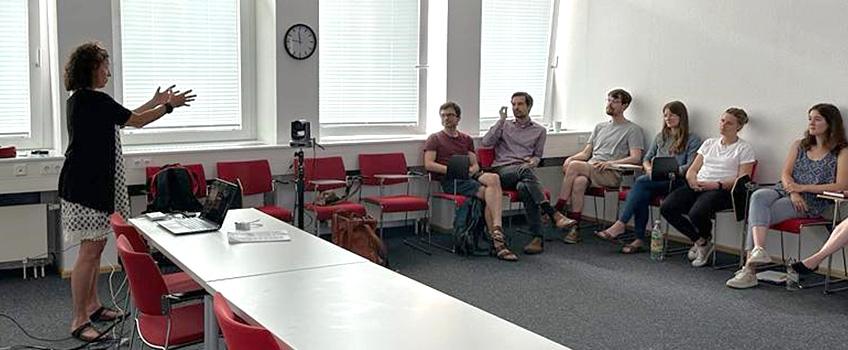Spotlight On: Tara L. Crowell

Tara L. Crowell, professor of Public Health at Stockton, presenting during her Fulbright work in Germany this summer.
Galloway, N.J. – Tara L. Crowell, professor of Public Health, spent time this summer at Koblenz Landau University in Germany as a Fulbright Specialist. Crowell, entering her 24th year teaching at Stockton, shared some insights from her experience.
I know this is a competitive process to be selected. When you learned you were, how did you feel?
With the help of Mary Lou Galantino, I decided to apply. We worked together during an all-day FAWN Workshop in May to draft my answers to application questions and for me to understand the application process. I submitted my application by the end of May and received acceptance at the beginning of August. I was excited and grateful to be chosen to participate in such a prestigious and experiential opportunity.
Can you share what your Fulbright work in Germany is about?
By creating and providing instructional workshops and lectures in my areas of expertise (Quantitative Research Methods & Statistics, Public Health Community Engagement Education and Research) to faculty and students, my goal in serving as a Fulbright Specialist is two-fold: 1). Facilitating workshops, seminars, etc. and 2). Engaging in community-based, real-world public health educational / research projects.
First, my efforts will help contribute to faculty development and program curriculum. Specifically, I plan to provide novel pedagogical strategies for developing, collecting and disseminating quantitative research and statistics using a variety of teaching modalities.
I worked in the Psychology Department, linking the two disciplines - Psychology and Public Health, both in the classroom (lectures to undergraduates and graduates) and discussing and helping with research studies. I also helped with verbal and written communication for faculty and graduate students when presenting their research in English to an American audience.
Were there differences in how they taught Public Health versus how we do?
The difference is more in the educational structure there, less in how you teach them. Undergraduates are just three years - just major classes (this is why they attend high school until 19 - to complete all basic requirements). Also, graduate students do all their courses during their master's degree and then just during doctorate work - they do research, clinic and teaching.
Living, working and immersing in a culture is truly a unique experience. It is almost as if you have a paradigm shift in how you view the world around you. Every day, through discussions and observations (both personally and professionally), the similarities and differences between our cultures were apparent; sharing and understanding both enriches all parties involved.
Were there specific moments abroad that really made an impact on you? Can you share those and why?
Living, working and immersing in a culture is truly a unique experience. I believe the entire process impacts you in a life-changing experience. It is almost as if you have a paradigm shift in how you view the world around you. Every day, through discussions and observations (both personally and professionally), the similarities and differences between our cultures were apparent; sharing and understanding both enriches all parties involved. My future teaching and research will certainly benefit, as I believe will theirs.
Were there any moments in the classroom or during your work that moved you?
I think the quality of students is worth mentioning- I feel they are more rigorous in their studies. Also, the government is paying for their studies, so getting accepted to schools and programs is more competitive.
This research and collaboration sounds ongoing; how do you see this work evolving in the future?
Yes, we are going to try to continue this collaboration, specifically with faculty hopefully coming to visit here. Also, continuing collaboration on research articles - input on research methodology instruments, sample collection, data analysis and editing for English-speaking audiences.
As William Fulbright states, "Educational exchange can turn nations into people, contributing as no other form of communication can to the humanizing of international relations."
Hopefully, this began a continuous reciprocal relationship between Stockton and Koblenz Landau University - linking teaching and research with faculty and students.
Learn more about the Fulbright experience and opportunities here.
Reported by Mandee McCullough
Photos submitted


